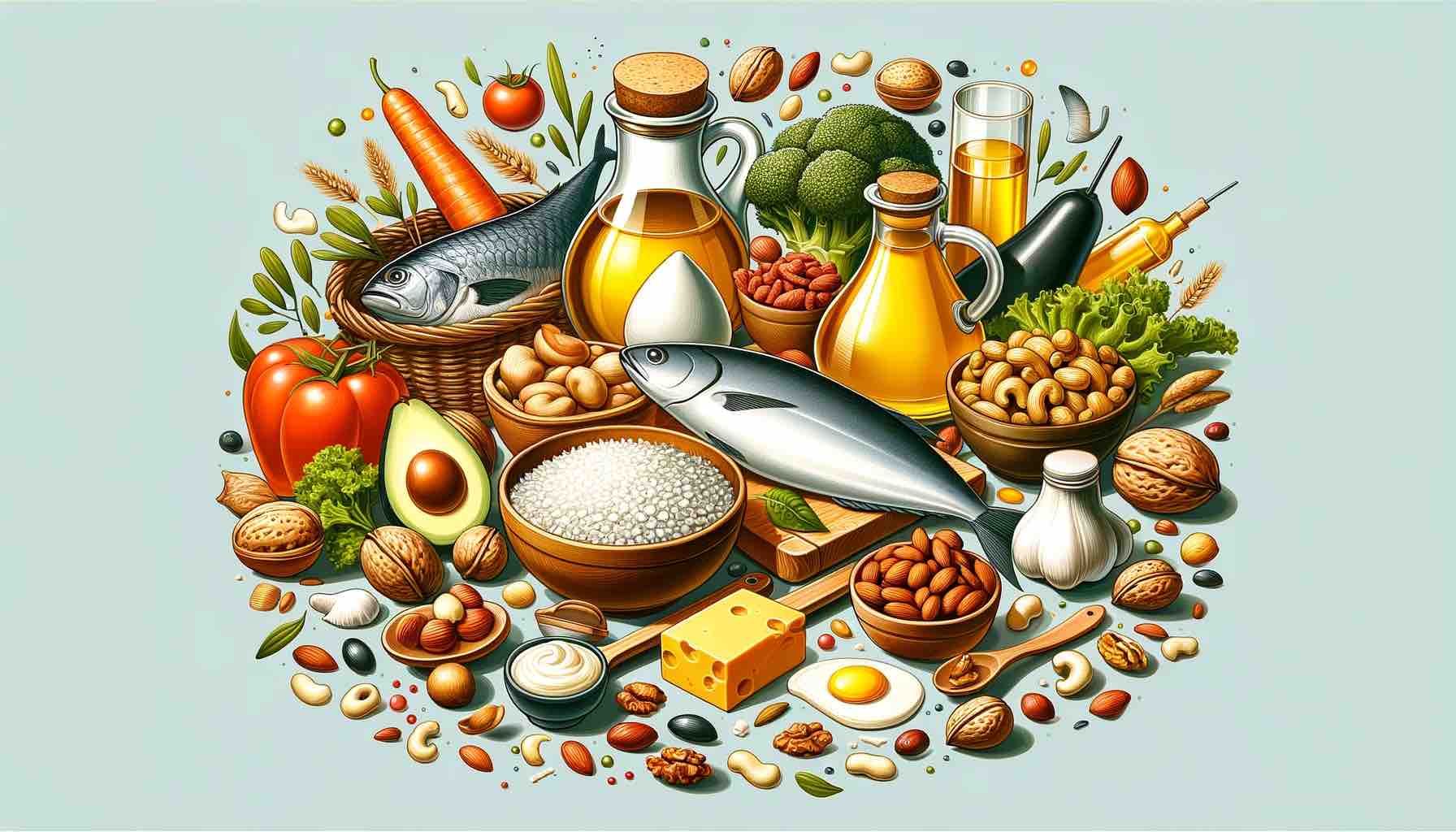
“Fat” – a simple three-letter word that has sparked endless debates in kitchens and nutritionists’ offices worldwide. But does indulging in your favorite fatty foods really lead you down the path to weight gain? It’s time to cut through the noise and uncover the truth.
In a culinary world where avocado toast reigns supreme in the West and ghee-smeared rotis are a staple in Indian households, understanding the role of fat in our diet has never been more crucial. From the bustling streets of Mumbai to the chic cafes of New York, fat is everywhere, yet its impact on our waistlines remains one of the most misunderstood aspects of nutrition.
In this deep dive, we’re not just skimming the surface. We’ll unravel the complex relationship between dietary fats and body weight, debunk myths with scientific facts, and traverse a diverse culinary landscape to discover how different cultures, including the rich flavors of Indian cuisine, embrace fats.
Are you ready to challenge everything you thought you knew about fats? Let’s embark on this flavorful journey of discovery.
The Fat Paradox: Understanding the Basics
Before we delve into the bustling spice markets of India or the olive groves of the Mediterranean, let’s get to the heart of the matter: What exactly are fats, and how do they function in our bodies? This section isn’t just about the science; it’s about dismantling long-held beliefs with clarity and precision.
Unraveling the Types of Fats
Dietary fats come in various forms, each playing a unique role in our health. There are the vilified saturated fats, commonly found in butter and red meat, and the celebrated unsaturated fats, seen in the likes of olive oil and nuts. Then there’s the notorious trans fats, lurking in processed foods, known for their adverse health effects. But here’s the twist: not all fats behave the same way inside our bodies, and their impact on our weight is more complex than a simple “good” or “bad” label.
The Indian Context: Ghee and Beyond
In India, ghee (clarified butter) isn’t just a cooking ingredient; it’s a cultural icon, deeply rooted in culinary traditions and Ayurvedic medicine. Contrary to popular Western belief, ghee and other traditional fats like coconut oil have been integral to Indian diets for centuries, without the rampant obesity rates seen in more recent times.
The Global Misconception
Globally, the fat phobia that took off in the 20th century led to an onslaught of low-fat diets. But here’s the catch: as fat consumption decreased, obesity rates soared. It turns out that removing fat from our diets wasn’t the magic bullet for weight loss. Instead, it led to increased consumption of sugars and refined carbs – the real culprits behind the obesity epidemic.
In the next section, we’ll dive into the science behind why eating fat doesn’t necessarily make you fat and how different cultures, including India, have embraced fats in their balanced diets.
The Science of Fats and Weight: Debunking Myths with Facts
As we journey deeper into the world of dietary fats, it’s crucial to understand the science behind them and their impact on our weight. This is where myth meets reality, and long-held misconceptions are challenged with hard facts.
Fats Don’t Make You Fat: The Caloric Misconception
The age-old adage that “eating fat makes you fat” oversimplifies a complex reality. The truth is, fats are calorie-dense, but they aren’t inherently fattening. Weight gain occurs when you consume more calories than you burn, regardless of whether those calories come from fats, carbs, or proteins. The key to understanding this lies in balancing your total caloric intake with your lifestyle and activity levels.
Cultural Evidence: Indian Diets and Global Comparisons
In India, diets rich in natural fats like ghee and coconut oil have coexisted with lower obesity rates compared to Western countries where low-fat diets prevailed. This contrast offers a compelling narrative: it’s not just about the amount of fat consumed, but the overall dietary pattern and lifestyle. Traditional Indian diets are often balanced with whole grains, lentils, vegetables, and spices, forming a holistic approach to nutrition.
The Role of Healthy Fats: Beyond Weight Management
Healthy fats, particularly monounsaturated and polyunsaturated fats, play a vital role beyond just weight management. They contribute to heart health, brain function, and overall well-being. These fats, found in foods like nuts, seeds, fish, and various oils, are essential for absorbing fat-soluble vitamins and providing sustained energy.
The Processed Food Problem: Trans Fats and Refined Carbs
The real issue in the modern diet is the high consumption of processed foods rich in trans fats and refined carbohydrates. These components are more likely to contribute to weight gain and health issues than natural dietary fats.
In the upcoming section, we’ll explore how to incorporate healthy fats into your diet, drawing inspiration from both global and Indian cuisines, to create a balanced and nourishing eating pattern.
Incorporating Healthy Fats: A Global Culinary Adventure
Now that we’ve debunked the myth that fats directly lead to weight gain, let’s explore how to incorporate healthy fats into our diets. This isn’t just about nutrition; it’s a culinary adventure that spans the globe, from the heart of India to the far reaches of the Mediterranean.
Embracing Good Fats: Monounsaturated and Polyunsaturated
- Indian Inspiration: Turn to dishes like dal seasoned with mustard oil or chana masala with a hint of ghee. These traditional Indian recipes show how healthy fats can be part of a balanced diet.
- Mediterranean Marvels: Olive oil isn’t just for salads; it’s a staple in Mediterranean cooking. Use it for sautéing vegetables or as a base for dressings.
Nuts, Seeds, and Beyond: Snacking and Cooking
- Nutty Delights: Snack on almonds, walnuts, or pumpkin seeds – great sources of healthy fats. Add them to your oatmeal, yogurt, or salads for an extra nutritional punch.
- Cooking Oils: Experiment with different oils like coconut, mustard, or peanut oil. Each has unique properties and flavors suitable for various cooking styles.
Fatty Fish: Omega-3 Powerhouses
- Global Selections: Incorporate fatty fish like mackerel, herring, and trout into your diet. These are not only delicious but also rich in omega-3 fatty acids, crucial for heart and brain health.
The Balance: Moderation and Variety
The key to benefiting from dietary fats is moderation and variety. It’s about enjoying a range of fats – from the saturated fats in ghee to the polyunsaturated fats in fish – while balancing them with other macronutrients and whole foods.
In our next section, we’ll look at how different cultures, including India, have historically embraced fats in their diets, providing a broader perspective on this essential macronutrient.
The Role of Fats in Specific Diets and Their Glycemic Impact
The Ketogenic Diet: Fats in the Spotlight
- Overview of the Keto Diet: This diet emphasizes high fat intake, moderate protein, and low carbohydrate consumption. It’s designed to shift the body into a state of ketosis, where fats, rather than carbohydrates, are used as the primary energy source.
- Fats in Keto: Discuss the types of fats recommended in a ketogenic diet, such as MCT oil, and their roles in achieving and maintaining ketosis.
Understanding the Glycemic Impact of Fats
- Fats and Glycemic Index: Fats have a low glycemic index and do not directly impact blood sugar levels, unlike carbohydrates. However, when combined with other foods, fats can slow the absorption of carbohydrates, potentially lowering the overall glycemic impact of a meal.
- Practical Applications: Provide examples of how combining fats with higher GI foods can balance the glycemic load, benefiting individuals who need to manage blood sugar levels, such as those with diabetes.
Balancing Fats for Optimal Health
- Navigating Fat Choices in Various Diets: Whether following a ketogenic diet, a low-GI diet, or a culturally specific diet, the type and amount of fat consumed should be considered for overall health and specific health goals.
- Expert Opinions: Cite nutritionists or scientific studies that offer guidance on balancing fat intake in different dietary approaches.
Incorporating these aspects into the article would provide a more comprehensive understanding of dietary fats’ role in specific diets and their impact on glycemic index and load, making the article more informative and relevant to a wider audience.
Practical Tips: Integrating Healthy Fats into Your Daily Diet
Having explored the role of fats in diverse cuisines and debunked common myths, it’s time to bring this knowledge into our daily lives. Here are some practical tips and ideas for integrating healthy fats into your diet, inspired by both global and Indian culinary traditions.
Starting the Day Right: Breakfast Ideas
- Global Option: Avocado toast on whole-grain bread, a popular Western choice rich in monounsaturated fats.
- Indian Twist: Aloo paratha made with minimal ghee, combining the satiety of carbs with the richness of healthy fats.
Midday Meals: Lunch that Fuels
- International Flavor: Grilled fish like mackerel or sardines, drizzled with olive oil and lemon – a nod to Mediterranean diets.
- Indian Fusion: Dal tadka using a moderate amount of ghee or mustard oil, providing a balance of protein and healthy fats.
Evening Delights: Dinner Options
- Around the World: Stir-fried vegetables and tofu in sesame oil, incorporating elements of Asian cuisine.
- From India: Chicken curry made with coconut milk, offering a creamy texture and beneficial fats.
Snacks and Sides: Small Bites, Big Impact
- Global Snacking: A handful of mixed nuts or Greek yogurt with honey and walnuts.
- Indian Savories: Roasted chana (chickpeas) with a sprinkle of olive oil and chaat masala.
Sweet Endings: Desserts
- Universal Treat: Dark chocolate (above 70% cacao) for a heart-healthy indulgence.
- Indian Dessert: Carrot halwa prepared with almond milk and a touch of ghee.
These ideas demonstrate that integrating healthy fats into your diet can be both delicious and culturally diverse. By embracing fats from various global cuisines, including Indian, we can enjoy a diet that’s not only rich in flavor but also beneficial for our health.
In the conclusion, we’ll wrap up our exploration of dietary fats, emphasizing the importance of balance and moderation for a healthier lifestyle.
Conclusion: Embracing Fats for a Healthier Lifestyle
As we conclude our journey through the diverse world of dietary fats, one thing is abundantly clear: fats are not to be feared but embraced as an integral part of a balanced diet. The key lies in understanding their varied roles, making informed choices, and enjoying them in moderation.
The Takeaway: Balance and Moderation
- A Global Consensus: Whether it’s the Mediterranean diet rich in olive oil or the Indian diet with its use of ghee, the common thread is balance. It’s about incorporating a variety of fats in moderation, alongside other nutrients.
- Beyond Weight Gain: We’ve seen that fats, especially healthy ones, are essential for more than just maintaining weight. They’re crucial for overall health, supporting everything from heart function to brain health.
Integrating Cultural Wisdom
- Learning from Tradition: Traditional diets around the world, including Indian cuisine, offer valuable lessons in using fats healthily. These age-old culinary practices, when combined with modern nutritional science, pave the way for wholesome eating habits.
- Adapting to Modern Lifestyles: As our lifestyles evolve, so must our diets. Embracing healthy fats while being mindful of processed and unhealthy fats can lead to a more balanced and healthful way of eating.
Moving Forward
- As we move forward, let’s carry with us the understanding that fats, in their many forms, are a delicious and necessary part of our diets. By choosing the right types and amounts, we can enjoy the rich flavors and health benefits they offer.
We hope this exploration has enlightened and inspired you to look at dietary fats not just as a nutrient but as a flavorful bridge between cultures and a key to a healthier lifestyle.
10 FAQs and Answers for the Blog Post
- What role do dietary fats play in our overall health? Dietary fats are essential for energy, cell function, organ protection, hormone production, and nutrient absorption. They come in various types, each impacting the body differently.
- Can eating fats contribute to weight gain? Weight gain is primarily about caloric balance. While fats are calorie-dense, they don’t directly cause weight gain unless consumed in excess of your caloric needs, regardless of the source.
- How do healthy fats differ from unhealthy ones? Healthy fats, such as monounsaturated and polyunsaturated fats, support heart health and lower bad cholesterol. Unhealthy fats, like trans and excessive saturated fats, can increase heart disease risk and raise bad cholesterol.
- Are there any healthy fats in Indian cuisine? Indian cuisine uses various healthy fats, such as ghee and mustard oil, which have been part of traditional cooking practices and are balanced with other nutrient-rich foods.
- How can I incorporate healthy fats into my diet? Include a variety of sources like nuts, seeds, fatty fish, and plant oils in your diet. Cooking with olive oil, snacking on nuts, and adding avocado to salads are simple ways to increase healthy fat intake.
- What is the impact of fats on heart health? Healthy fats can lower the risk of heart disease by reducing bad cholesterol levels. However, unhealthy fats, especially trans fats, can increase cardiovascular risk.
- Do all fats have the same calorie content? Yes, all types of fat provide nine calories per gram, which is more than double the calories from protein or carbohydrates. Moderation is key, regardless of the fat type.
- Can fats be part of a weight loss diet? Yes, including healthy fats can be part of a weight-loss diet. They provide satiety, helping to reduce overall calorie intake, as long as they are consumed within caloric needs.
- What are some global examples of healthy fat consumption? The Mediterranean diet, rich in olive oil, nuts, and fish, is a prime example. It highlights how diets high in certain fats can be beneficial for health.
- Are there any misconceptions about dietary fats? A common misconception is that all fats are unhealthy and lead to weight gain. However, different types of fats have varied effects on the body, and not all are detrimental to health.
Blog Tags for the Post
dietary fats, healthy eating, weight management, heart health, Indian cuisine, global diets, nutrition myths, balanced diet, unsaturated fats, saturated fats, trans fats, Mediterranean diet, Indian cooking, omega-3 fatty acids, cholesterol management













